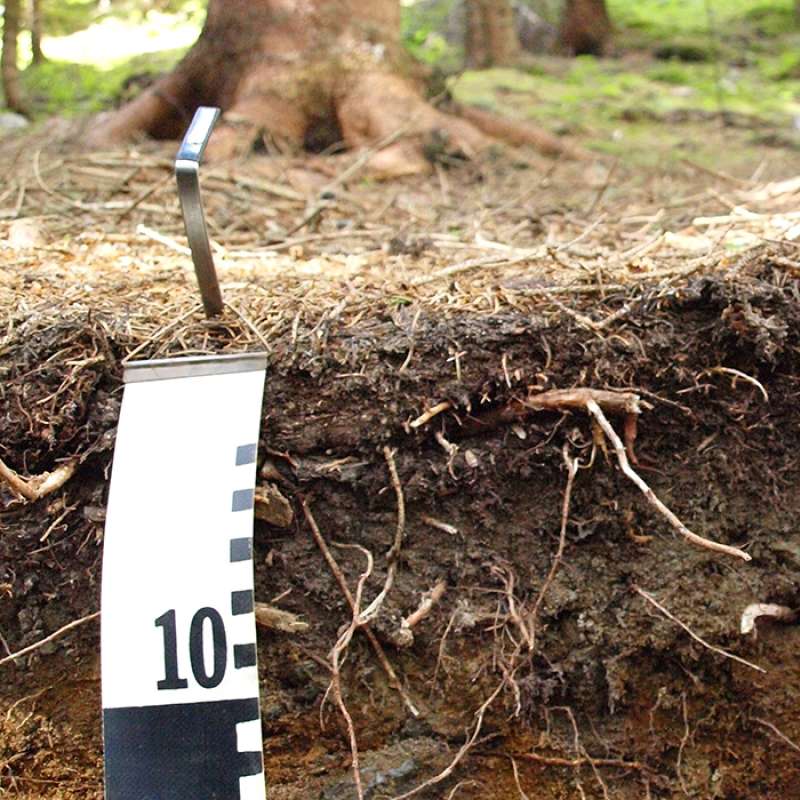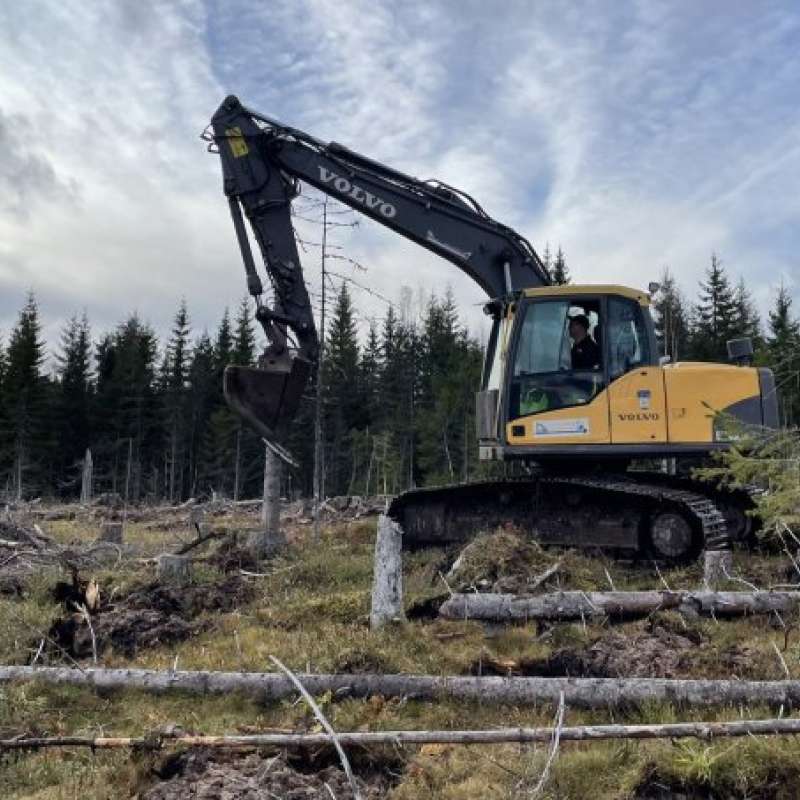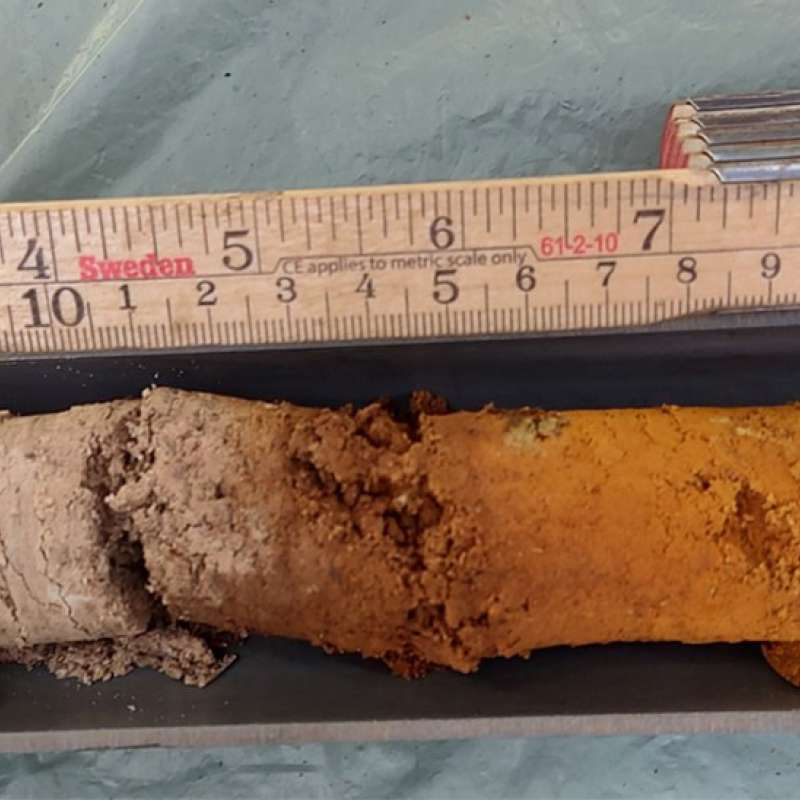O. Janne Kjønaas
Seniorforsker
Sammendrag
We assessed soil organic carbon (SOC) stocks and changes across six upland forest sites with 13replicated plots, spanning bioclimatic regions from the boreonemoral to the northern borealzone. The sites included three ICP Forests Level II plots in older coniferous stands and threelong-term experiments focusing on thinning intensity, tree species effects (Norway spruce, Scotspine, silver birch), and mixtures of Norway spruce and downy birch, the latter two followingclear-cutting. Repeated soil surveys spanned 9–34 years. SOC stocks in the organic LFH horizonranged from 1.4 to 3.6 kg m−2, while total stocks down to 30 cm and 70–100 cm mineral soildepths ranged from 3.0 to 13.5 kg m−2 and 8.5 to 17.5 kg m−2, respectively. Annual SOC stockchanges in the LFH horizon ranged from −106 to 111 g m−2 yr−1, with significant changesobserved in five plots. Total SOC stock changes down to 15, 18 or 20 cm mineral soil depthranged from −77 to 154 g m−2 yr−1, with significant increases detected in two ICP level II plots.Sensitivity analyses supported these findings but highlighted inconsistencies in samplingmethods, hight spatial variability, and limited replicates, affecting estimates in the remaining 11plots.ARTICLE HISTORYReceived 31 March 2025Accepted 8 July 2025KEYWORDSBoreal forest; downy birch;Norway spruce; Scots pine;soil organic carbon; SOC;SOC stock changesIntroductionForest ecosystems are crucial biomes for carbon (C)storage, with boreal forests playing a significant role asa C sink (Pan et al. 2011; Watts et al. 2023). Globally,the soil organic carbon (SOC) pool contains more thanthree times as much C as the atmosphere (Schmidt etal. 2011). From a climate perspective, the importanceof SOC storage is tied to its overall size as well as itspotential as a long-term reservoir. Estimates of SOCstocks in boreal upland forests suggest 3–4 times moreC relative to the aboveground tree biomass (Scharle-mann et al. 2014; Bradshaw and Warkentin 2015). Thebiological stability of SOC is mediated by a broad setof environmental drivers, notably temperature and soilmoisture content (Soucémarianadin et al. 2018).Additionally, microbial communities play an importantrole in both decomposition and accumulation of SOC(Lindahl et al. 2021; Gundale et al. 2024), processesthat are further influenced by forest management prac-tices (Mayer et al. 2020; Jörgensen et al. 2022) and treespecies (Mundra et al. 2022, 2024). The effect of treespecies on SOC stocks may primarily influence the distri-bution of SOC within the soil profile rather than the totalSOC stock (Vesterdal et al. 2013; Kjønaas et al. 2021). Thisdistribution, however, affects the stability of SOC and itsvulnerability to decomposition, consequently impactingthe CO2 flux from the soil (James and Harrison 2016;Cotrufo et al. 2019; Georgiou et al. 2024).Estimated C allocation in Norwegian forests is approxi-mately 21% in vegetation and 79% in soil (Grønlund etal. 2010). SOC stocks in Norwegian forest soils are con-sidered higher compared to those of Sweden andFinland (Olsson et al. 2009; Rantakari et al. 2012; Strandet al. 2016). This disparity may partly stem from varyinginventory methods. However, differences in precipitationand temperature gradients account for approximately68% of the variability in SOC stocks across Nordic forests(Callesen et al. 2003), suggesting that climate factors alsoplay a significant role. On a European scale, coniferousforest soils represent one of the largest and most vulner-able SOC stocks (Lugato et al. 2021). The size and stabilityof the SOC stock may determine the magnitude of© 2025 The Author(s). Published by Informa UK Limited, trading as Taylor & Francis GroupThis is an Open Access article distributed under the terms of the Creative Commons Attribution License (http://creativecommons.org/licenses/by/4.0/), which permits unrestricted use,distribution, and reproduction in any medium, provided the original work is properly cited. The terms on which this article has been published allow the posting of the AcceptedManuscript in a repository by the author(s) or with their consent.CONTACT O. Janne Kjønaas janne.kjonaas@nibio.noSupplemental data for this article can be accessed online at https://doi.org/10.1080/02827581.2025.2533379.SCANDINAVIAN JOURNAL OF FOREST RESEARCH2025, VOL. 40, NOS. 7–8, 321–356https://doi.org/10.1080/02827581.2025.2533379
Forfattere
Carl-Fredrik Johannesson H. Ilvesniemi O. Janne Kjønaas K.S. Larsen A. Lehtonen Jenni Nordén D. Paré Hanna Marika Silvennoinen J. Stendahl I. Stupak L. Vesterdal Lise DalsgaardSammendrag
Nordic and Canadian forests store substantial amounts of carbon (C) and are largely managed in a silvicultural system with clear-cut harvest. Previous meta-analyses of harvesting effects on soil C have shown short- to long-term declines after harvest, but effects of clear-cutting on boreal and northern temperate forest soil C stocks remain unresolved. We harmonized National Forest Soil Inventory (NFSI) data from Sweden, Denmark, Finland, Norway and Canada to examine soil C stocks up to 53 years following clear-cut harvest using a space-for-time approach. We analyzed forest floor and mineral soil C stocks in coniferous and deciduous/mixed forests. Coniferous forest floor C stocks decreased for ∼30 years after clear-cutting: when at its lowest stock level, Picea and Pinus forest floor C stocks had decreased by 23 % and 14 % relative to initial stock levels, respectively. Picea forest floor C stocks then remained close to its lowest levels until 53 years after clear-cutting, while for Pinus-dominated forests they increased again and recovered to the pre-harvest level 48 years after clear-cutting. No C stock changes were detected in the 0–10 cm or 10–20 cm mineral soil layers, while a small increase in 55–65 cm mineral soil was detected in Podzol soils. Data was too limited to detect statistical signals of clear-cutting for deciduous/mixed forests. Our results shows that clear-cut harvest has substantial and long-lasting effects on northern temperate and boreal forest soil C storage, and that combining data from several NFSIs can help elucidate forest management effects on soil C storage. Soil organic carbonForest harvestClear-cuttingBorealTemperateNational forest inventoryNational forest soil inventory
Sammendrag
Litter decomposition is coupled to carbon (C) sequestration through C release to the atmosphere, C transformation and nutrient release to the soil. We investigated if clear-cutting has long-term effects on this vital ecological process and consequently on C dynamics in boreal forests using twelve pairs of previously clear-cut and near-natural forests. Three litterbag experiments were conducted using (I) standardised spruce and bilberry litter, (II) melanised and non-melanised fungal necromass and (III) rooibos and green tea. We found weak and inconsistent effects of harvesting history, that did not depend on litter quality or mesofauna exclusion. Litter quality was more important in explaining net mass remaining for fungal necromass than for aboveground plant litter. Mesofauna exclusion had only marginal effects on initial litter decomposition. Results obtained with the highly standardised Tea Bag Index were not readily comparable to those of the plant litter or fungal necromass and we therefore question its use in this regional context. Further, we show that net mass or C remaining in the litterbags do not correlate consistently with in situ soil respiration. This finding is discussed in relation to previous measurements of soil C fluxes from the same system. In conclusion, we suggest that potential disturbances to the physical environment or the capacity of the decomposer community to facilitate litter decomposition are no longer clearly evident when clear-cut stands approach maturity.

Divisjon for skog og utmark
EcoForest - Forestry effects on biodiversity, carbon stocks and ecological processes in mature boreal forests
Formålet med prosjektet er å fremskaffe kunnskap knyttet til langsiktige effekter av skogskjøtsel på biodiversitet, karbonlagre og økologiske prosesser.

Divisjon for skog og utmark
Markberedning og karbon
«Markberedning og karbon» er et samarbeidsprosjekt mellom næringsaktørene i Innlandet, Statsforvalteren i Innlandet, Skogkurs og forskningsinstitusjonene i skogbruket i Norge, med Glommen Mjøsen Skog som prosjekteier. Prosjektet har som mål å dokumentere markberedningens effekt på karbonbalansen i skogøkosystemet gjennom å måle lager av karbon, samt utslipp og opptak, i markberedt skog og kontrollflater.

Divisjon for skog og utmark
Carbon sequestration in Norwegian spruce forest soils (CONSEQUENCE)
Norway has pledged to reduce its greenhouse gas emissions, and one of the strategies and ultimate goal is to increase the short and long-term sequestration of organic carbon in forest soil to enhance the carbon stock of soil organic carbon in forests. Altering forest management strategies, such as extending rotation periods and clear-cutting methods, may change soil carbon storage, accumulation and loss.
